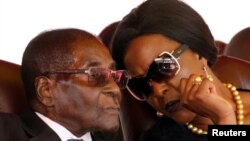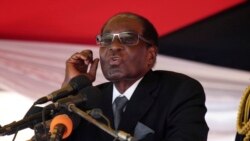The African Commission on Human and People’s Rights currently meeting in Banjul, Gambia, was Thursday briefed about the alleged unconstitutional activities of President Robert Mugabe and First Lady Grace Mugabe.
Addressing participants in Banjul, human rights lawyer, Lizwe Jamela of the Zimbabwe Lawyers for Human Rights (ZLHR), raised serious concern with Mr. Mugabe’s decision to rescind the appointment of Prosecutor General (PG), Ray Goba calling the move “unconstitutional”.
President Mugabe on Friday 27 October 2017 reversed the appointment of Advocate Goba as the country’s PG through an Extraordinary Government Gazette, General Notice 642 of 2017.
Mr Mugabe did not give reasons for the shocking decision. “It is hereby notified that the captioned General Notice (493 of 2017) that was published in the Gazette Extraordinary on the 13th September, 2017 is repealed,” read the notice. Advocate Goba had, however, not officially taken up office as he was yet to be sworn-in.
According to Section 259 (6) of the Constitution, “before taking up office, the Prosecutor-General must take, before the President or a person authorized by the President, the oath of office in the form set out in the Third Schedule”.
The Permanent Secretary in the Ministry of Justice, Legal and Parliamentary Affairs, Mrs. Virginia Mabiza, told the state-controlled Herald newspaper that the president has the discretion, at law, to order the Judicial Service Commission (JSC) to submit another list of candidates for appointment.
But ZLHR has described the decision as unconstitutional and has dragged Mr. Mugabe and the JSC to the High Court. In a founding affidavit filed together with the urgent chamber application and signed by ZLHR Executive Director Roselyn Hanzi Wednesday, the human rights organization argued that it has a “direct and substantial interest in the obedience and observance of the provisions of the Constitution by all individuals and organs bound by it and that the Constitution is the supreme law of Zimbabwe and every conduct inconsistent with it is invalid to the extent of the inconsistency.”
The human rights organization contended that the PG can only be removed from office by President Mugabe upon the advice of a tribunal set up in terms of Section 187 of the Constitution and that the Constitution does not provide another different route that can be followed to remove the PG from office.
Until he was appointed substantive PG following interviews conducted by the JSC, Goba had been acting since the July 2016 suspension and subsequent dismissal of Johannes Tomana on alleged “gross incompetence and misconduct.”
Tomana became the first occupant of a separate office of criminal prosecutions created by the new Constitution in 2013.
Under the old Constitution, the Attorney-General was responsible for advising the government and prosecuting criminal cases on behalf of the state.
Under the new dispensation, the two functions have been separated, with the PG’s office now responsible for criminal prosecutions.
FIRST LADY GRACE MUGABE
The ZLHR also tabled the issue of First lady Grace Mugabe’s alleged misuse of the police “to violently evict settlers” at Arnold Farm in Mashonaland Central Province. The Mugabe family has three farms in the province – Gushungo Farm, Iron Mask Farm and Mazowe Citrus Estate - they occupied in 2001. Arnorld or Manzou Farm was owned by Anglo-American before it was invaded by villagers when the ruling Zanu PF party embarked on a land reform program targeting white commercial farms in 2000.
At least 200 families face eviction from the farm to pave way for the establishment of a national park. Mrs. Mugabe confirmed her interest in taking the farm when she addressed a rally in 2014 in the province.
“I applied for a conservancy in this area (Manzou) which was being run by whites. I had seen it lying idle and I applied to use it to raise money to look after children at the Mazowe Children’s Home and I was given an offer letter by authorities. The people who were squatting on that conservancy were then ordered off the property.”
VOA Zimbabwe was the first to exclusively get official confirmation from the governor of Mashonaland Central province, Martin Dinha, that the first lady wanted to occupy the farm and it is the province that had approached her to establish a game reserve.
“I want to place it on record as I have done before that Manzou Game Reserve is a designated parks and wildlife area. Manzou Game Conservancy and the surrounding farms are protected areas and should not be subjected to any settlement. Anyone who occupied or resettled in Manzou did so illegally. The state cannot promote or allow squatters or legalize illegal settlements. As provincial authorities, we have a duty to protect the environment and our heritage such as the sacred land of Gomba and Manzou where Mbuya Nehanda lived.”
THE Zimbabwe Human Rights Commission (ZHRC) produced a report ordering Mrs. Mugabe to stop her “violent eviction of villagers and the hostile takeover of Arnold Farm in Mazowe for the expansion of her business empire.”
The report alleged that Mrs. Mugabe’s actions, abetted by state institutions, violated villagers’ rights to shelter, water and education, among others.
“The ZHRC notes that the relocation of people from Arnold Farm without suitable alternative land was not sanctioned by the courts as required by the law, and is, therefore, in violation of numerous rights,” the commission said.
“In the course of the evictions, the rights to freedom from arbitrary evictions, education, health administrative justice [and] freedom of movement were chief among those negatively impacted.”
The police in March 2015, demolished homes and evicted over 700 villagers from the same farm, allegedly at the instigation of the First Family.
The villagers were later dumped in Rushinga, Lazy and Blagdon farms in Concession before they took legal action and got a High Court reprieve to stay at the property until they had been allocated an alternative piece of land to settle.
Jamela also told VOA Studio 7 that human rights activists want the Commission to investigate the appointment of a cyber minister and the alleged crackdown on social media users.
The first victim of the crackdown is American citizen Martha O’ Donovan who is being charged with attempting to overthrow Mr. Mugabe for allegedly twitting that, “We are being led by a selfish and sick man,” on 11 October 2017 and posting a photo illustration showing that President Mugabe is surviving on a catheter.”
Jamela says he further presented before the commission evidence of the worsening political and economic crisis in Zimbabwe.
Director of the Africa Programme at International Commission of Jurists, Arnold Tsunga, commenting on the Afican frican Commission told VOA Zimbabwe that, “there is also the usual business where they look at the situation of human rights defenders on the continent and hear it from civil society that have observer status, then ultimately make decisions on some of the countries.”
PRESIDENT BARROW
The 61st Ordinary Session of the African Commission for Human and Peoples' Rights runs from November 1st to 15th.
The session is aimed at highlighting the performance and challenges of the Commission as well as further cement the respect and protection of fundamental human rights. The 61st ordinary session also coincided with the 30th anniversary of the Commission since it came into being in 1978.
In his official opening statement, the president of The Gambia Adama Barrow, assured the Commission of his government's continuous cooperation and collaboration with the Commission.
He said the people of the Gambia recognizes the commitment and support of the African Commission in ensuring that human rights are respected in The Gambia, despite the uncooperative attitude of the former regime.
"The Commission never shied away from carrying out its responsibility even when it seems impossible in the country", he said.






